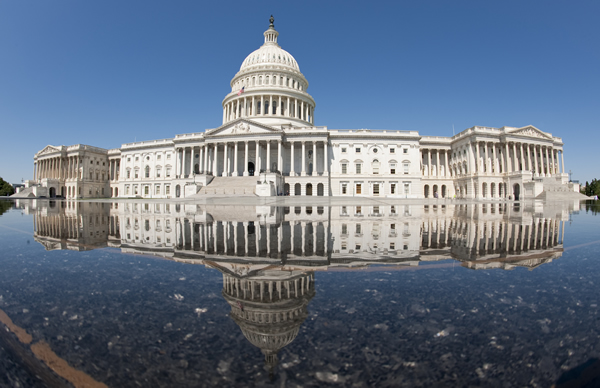Washington remains embroiled in debt limit negotiations as Republicans and Democrats stand apart on how to best go about increasing the amount of money the government can borrow and spend. But on the sidelines, another debate simmers over one amendment to the U.S. Constitution that could have averted today’s spending debacle: the balanced budget amendment (BBA).
At its core, the BBA would mandate that Congress not spend more than its income–a notion that would truly be a radical departure from today’s course of business in the nation’s capital, where the national debt could eventually reach a staggering 344 percent of GDP by mid-century.
You might think that putting constitutional limits on Congress’s ability to borrow and spend beyond its means is an idea whose time has come. If so, you’d be in good company. In 1798, Thomas Jefferson, the great author of America, wrote that he longed for such a constraint:
I wish it were possible to obtain a single amendment to our Constitution. I would be willing to depend on that alone for the reduction of the administration of our government; I mean an additional article taking from the Federal Government the power of borrowing.
It’s an idea that has surfaced time and time again over our nation’s history, as former Congressman Ernest Istook writes in a new paper. The BBA was first proposed in 1936; it re-emerged in 1982 and again in the Republican revolution of the 1990s, when it was a central piece of the Contract with America. But, as Istook notes, the BBA drew sharp attacks from liberals who took issue with the limits it would impose on government:
The BBA is a powerful proposal that attracts great vitriol from the American Left, which recognizes it as an enormous threat to its big-government ways—perhaps the greatest threat. For that reason, the history of Congress’s work on a BBA is full of frustrations, high-profile defections, reversals, and betrayals.
The BBA has resurfaced again with this Congress, and Republicans in the House and Senate have announced that they will force votes on balanced budget constitutional amendments. If the Senate and House were to pass identical versions of a BBA, the constitutional amendment would then be sent to the states for ratification.
However, as they stand right now, though the Senate and House versions of the current BBA are similar, there are some important differences, as Heritage’s Brian Darling explains in a new report.
The provisions that vary between the House and Senate versions of the BBA may have dramatic policy implications for federal spending. One consistency in the two versions that is a departure from the Contract with America version of the BBA is a cap on federal spending. Both the Senate and House versions have a similar mechanism for capping spending at 18 percent of the economic output of the United States. This new idea would constrict the size of government.
The two versions of the BBA diverge significantly on such threshold questions as how each amendment’s provisions apply during times of “military conflict” and the number of votes required to waive the constitutional mandate that the budget be balanced during a fiscal year. Basically, the House version, that may be changed, allows for unlimited spending during “military conflicts” with a majority of House and Senate votes. The Senate version specifies the exact amount for the “military conflict” and requires both chambers to pass an unbalanced budget with a two-thirds vote.
The Senate version makes it more difficult to raise taxes, yet the language is crafted in a manner that may hamper efforts for revenue neutral tax reform.
Also under consideration is something called the Cut, Cap, and Balance Act, which would condition an increased debt limit on the House and Senate passage of the BBA. This vote might sideline the expected debate on the BBA in the House next week. The value of this approach is that, unlike the BBA requiring a two-thirds vote of each chamber, the Cut, Cap, and Balance Act requires only a simple majority vote to pass the House. If this measure passes, it would then be sent to the Senate for consideration.
It is indeed good news that Congress is debating measures to cap fed spending, make it harder to raise taxes, and force the federal government to balance the budget. States do it, families do it, and Congress should do it. But Congress shouldn’t let the perfect be the enemy of the good. By all accounts, this new and improved BBA is strong and would forward the goals of limiting the size of government.
Quick Hits:
- After five days of meetings with congressional leaders over the debt limit–and calls for some Members of Congress to be shut out of the closed-door talks–President Obama is holding another press conference this morning on the negotiations.
- The United States is granting Libyan rebel leaders full diplomatic recognition as the governing authority of Libya, paving the way for the rebel council to receive more than $30 billion in frozen U.S. assets.
- The Pentagon announced yesterday that in the spring, it suffered one of its largest losses ever of sensitive data in a cyber attack by a foreign government.
- Osama bin Laden was working on putting together a team of terrorists to attack the United States on the 10th anniversary of 9/11, according to information obtained from his Pakistani hideout.
- LIVE CHAT: Join former Congressman Ernest Istook for a Web chat on the debt limit today from 12 pm to 1 pm ET on Foundry.org.



























